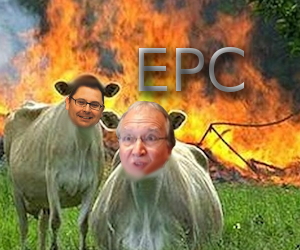

THE António Campinos-run European Patent Office (EPO) continues to grant software patents in Europe, apparently more easily than even the U.S. Patent and Trademark Office (USPTO) grants them. So say various law firms, facing the 'woes' (to them) of 35 U.S.C. €§ 101/Alice (SCOTUS).
"Various high-profile sites also regard/consider Watchtroll a "troll" (not just lobby for patent trolls) and perceive the site as too intellectually-dishonest to even link to; but apparently with Team Battistelli and Iancu it's absolutely fine."The Federal Circuit, citing SCOTUS, does not care what Andrei Iancu says about 35 U.S.C. ۤ 101. He's not a judge, but he attacks tribunals such as the Patent Trial and Appeal Board (PTAB) because of inter partes reviews (IPRs). It is very reminiscent of what Battistelli did 5 years ago. PTAB has been besieged (chief judge removed) and together with the litigation lobby -- people like David Boundy [1, 2] -- Iancu tries to discredit PTAB as a whole. Patently-O linked to this newly-revised paper from AIPLA Quarterly Journal a couple of hours ago. This one too is from Boundy.
"Recently (as recently as a week ago) Watchtroll did a series with the EPO which calls for software patenting and suggests ways to make that easier."Iancu nowadays does to the rule of law what the EPO did to the EPC. In Watchtroll he and EPO officials have recently given 'interviews'. For those who don't know, Watchtroll is as radical as one can get in the patent sphere -- it's the only site we refuse to even link to because of its radical views. It's attacking judges, politicians and officials who care about science as opposed to patent trolls and litigators. Various high-profile sites also regard/consider Watchtroll a "troll" (not just lobby for patent trolls) and perceive the site as too intellectually-dishonest to even link to; but apparently with Team Battistelli and Iancu it's absolutely fine.
Recently (as recently as a week ago) Watchtroll did a series with the EPO which calls for software patenting and suggests ways to make that easier. Some hours ago Michael Borella, a proponent of software patents (he doesn't develop software, he's in the litigation 'industry'), wrote about how EPO (mal)practices help the USPTO find excuses to grant abstract patents in defiance of Alice. To quote:
On July 1, the Patent Trial and Appeal Board (PTAB) of the U.S. Patent and Trademark Office (USPTO) designated four of its recent 35 U.S.C. ۤ 101 decisions as informative. Each of these decisions came down after and applied the USPTO's 2019 Revised Patent Subject Matter Eligibility Guidance. Two resulted in claims being found eligible, and two had the opposite outcome. While not binding on other PTAB panels or examiners, these cases are helpful in understanding how the PTAB is applying the Guidance. In particular, the PTAB appears to be utilizing the Guidance in a fashion that is similar to how the subject matter eligibility inquiry is employed in the European Patent Office and certain other jurisdictions -- as consideration of whether the claimed invention is a technical solution to a technical problem.
[...]
There are a few lines of reasoning running through these four cases that are worth pointing out. For the two that were found meet the requirements of ۤ 101, the claims therein are narrowly focused and provide a technical solution to a technical problem. For each, the technical problem and technical solution were described in the specification, and explicitly reflected in the claim language. On the other hand, for the two cases that failed the Alice test, the PTAB specifically stated that the claims were not addressing technical problems, and were broadly drafted.
This suggests that the PTAB may be following a variant of the European view that eligible subject matter must be directed to a technical solution to a technical problem. If so, that is problematic because there is no requirement in U.S. patent law that ۤ 101 be applied so rigidly. In fact, the Federal Circuit found the claims in DDR Holdings v. Hotels.com to be eligible despite their being focused on a technical solution to a business (non-technical) problem.
"They break the rules and hope that buzzwords can help to obscure their illegal agenda."As we mentioned the other day, IAM also paid some lip service to this agenda when it painted software patents as "blockchain" patents and hours ago blockchain enthusiasts linked to that; those are fake patents or abstract patents riding hype waves and exploiting officials whose sole objective is granting as many patents as possible. To quote:
South Korea has the highest blockchain patent grant rate, according to London-based law firm Withers & Rogers. Meanwhile, Japan comes at a distant second, intellectual property business media platform IAM reports on July 23.